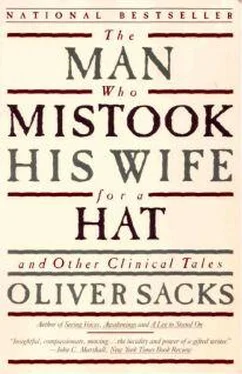Oliver Sacks - The man who mistook his wife for a hat
Здесь есть возможность читать онлайн «Oliver Sacks - The man who mistook his wife for a hat» весь текст электронной книги совершенно бесплатно (целиком полную версию без сокращений). В некоторых случаях можно слушать аудио, скачать через торрент в формате fb2 и присутствует краткое содержание. Жанр: Психология, на английском языке. Описание произведения, (предисловие) а так же отзывы посетителей доступны на портале библиотеки ЛибКат.
- Название:The man who mistook his wife for a hat
- Автор:
- Жанр:
- Год:неизвестен
- ISBN:нет данных
- Рейтинг книги:5 / 5. Голосов: 1
-
Избранное:Добавить в избранное
- Отзывы:
-
Ваша оценка:
- 100
- 1
- 2
- 3
- 4
- 5
The man who mistook his wife for a hat: краткое содержание, описание и аннотация
Предлагаем к чтению аннотацию, описание, краткое содержание или предисловие (зависит от того, что написал сам автор книги «The man who mistook his wife for a hat»). Если вы не нашли необходимую информацию о книге — напишите в комментариях, мы постараемся отыскать её.
The man who mistook his wife for a hat — читать онлайн бесплатно полную книгу (весь текст) целиком
Ниже представлен текст книги, разбитый по страницам. Система сохранения места последней прочитанной страницы, позволяет с удобством читать онлайн бесплатно книгу «The man who mistook his wife for a hat», без необходимости каждый раз заново искать на чём Вы остановились. Поставьте закладку, и сможете в любой момент перейти на страницу, на которой закончили чтение.
Интервал:
Закладка:
I found another photo in the magazine and pushed it over to him.
'That's an aircraft carrier,' he said. 'Real ultramodern design. I never saw one quite like that.'
'What's it called?' I asked.
He glanced down, looked baffled, and said, 'The Nimitzl'
'Something the matter?'
'The hell there is!' he replied hotly. 'I know 'em all by name, and I don't know a Nimitz … Of course there's an Admiral Nimitz, but I never heard they named a carrier after him.'
Angrily he threw the magazine down.
He was becoming fatigued, and somewhat irritable and anxious, under the continuing pressure of anomaly and contradiction, and their fearful implications, to which he could not be entirely oblivious. I had already, unthinkingly, pushed him into panic, and felt it was time to end our session. We wandered over to the window again, and looked down at the sunlit baseball diamond; as he looked his face relaxed, he forgot the Nimitz, the satellite photo, the other horrors and hints, and became absorbed in the game below. Then, as a savoury smell drifted up from the dining room, he smacked his lips, said 'Lunch!', smiled, and took his leave.
And I myself was wrung with emotion-it was heartbreaking, it was absurd, it was deeply perplexing, to think of his life lost in limbo, dissolving.
'He is, as it were,' I wrote in my notes, 'isolated in a single moment of being, with a moat or lacuna of forgetting all round him … He is man without a past (or future), stuck in a constantly changing, meaningless moment.' And then, more prosaically, 'The remainder of the neurological examination is entirely normal. Impression: probably Korsakov's syndrome, due to alcoholic degeneration of the mammillary bodies.' My note was a strange mixture of facts and observations, carefully noted and itemised, with irrepressible meditations on what such problems might 'mean', in regard to who and what and where this poor man was-whether, indeed, one could speak of an 'existence', given so absolute a privation of memory or continuity.
I kept wondering, in this and later notes-unscientifically- about 'a lost soul', and how one might establish some continuity, some roots, for he was a man without roots, or rooted only in the remote past.
'Only connect'-but how could he connect, and how could we help him to connect? What was life without connection? 'I may
venture to affirm,' Hume wrote, 'that we are nothing but a bundle or collection of different sensations, which succeed each other with an inconceivable rapidity, and are in a perpetual flux and movement.' In some sense, he had been reduced to a 'Humean' being- I could not help thinking how fascinated Hume would have been at seeing in Jimmie his own philosophical 'chimaera' incarnate, a gruesome reduction of a man to mere disconnected, incoherent flux and change.
Perhaps I could find advice or help in the medical literature- a literature which, for some reason, was largely Russian, from Korsakov's original thesis (Moscow, 1887) about such cases of memory loss, which are still called 'Korsakov's syndrome', to Lu-ria's Neuropsychology of Memory (which appeared in translation only a year after I first saw Jimmie). Korsakov wrote in 1887:
Memory of recent events is disturbed almost exclusively; recent impressions apparently disappear soonest, whereas impressions of long ago are recalled properly, so that the patient's ingenuity, his sharpness of wit, and his resourcefulness remain largely unaffected.
To Korsakov's brilliant but spare observations, almost a century of further research has been added-the richest and deepest, by far, being Luria's. And in Luria's account science became poetry, and the pathos of radical lostness was evoked. 'Gross disturbances of the organization of impressions of events and their sequence in time can always be observed in such patients,' he wrote. 'In consequence, they lose their integral experience of time and begin to live in a world of isolated impressions.' Further, as Luria noted, the eradication of impressions (and their disorder) might spread backward in time-'in the most serious cases-even to relatively distant events.'
Most of Luria's patients, as described in this book, had massive and serious cerebral tumours, which had the same effects as Korsakov's syndrome, but later spread and were often fatal. Luria included no cases of 'simple' Korsakov's syndrome, based on the self-limiting destruction that Korsakov described-neuron destruction, produced by alcohol, in the tiny but crucial mammillary
bodies, the rest of the brain being perfectly preserved. And so there was no long-term follow-up of Luria's cases.
I had at first been deeply puzzled, and dubious, even suspicious, about the apparently sharp cut-off in 1945, a point, a date, which was also symbolically so sharp. I wrote in a subsequent note:
There is a great blank. We do not know what happened then- or subsequently . . . We must fill in these 'missing' years- from his brother, or the navy, or hospitals he has been to . . . Could it be that he sustained some massive trauma at this time, some massive cerebral or emotional trauma in combat, in the war, and that this may have affected him ever since? . . . was the war his 'high point', the last time he was really alive, and existence since one long anti-climax?*
We did various tests on him (EEG, brain scans), and found no evidence of massive brain damage, although atrophy of the tiny mammillary bodies would not show up on such tests. We received reports from the navy indicating that he had remained in the navy until 1965, and that he was perfectly competent at that time.
Then we turned up a short nasty report from Bellevue Hospital, dated 1971, saying that he was 'totally disoriented . . . with an advanced organic brain-syndrome, due to alcohol' (cirrhosis had also developed by this time). From Bellevue he was sent to a wretched dump in the Village, a so-called 'nursing home' whence he was rescued-lousy, starving-by our Home in 1975.
We located his brother, whom Jimmie always spoke of as being in accountancy school and engaged to a girl from Oregon. In fact
*In his fascinating oral history The Good War (1985) Studs Terkel transcribes countless stories of men and women, especially fighting men, who felt World War II was intensely real-by far the most real and significant time of their lives-everything since as pallid in comparison. Such men tend to dwell on the war and to relive its battles, comradeship, moral certainties and intensity. But this dwelling on the past and relative hebetude towards the present-this emotional dulling of current feeling and memory-is nothing like Jimmie's organic amnesia. 1 recently had occasion to discuss the question with Terkel: 'I've met thousands of men,' he told me, 'who feel they've just been "marking time" since '45-but I never met anyone for whom time terminated, like your amnesiac Jimmie.'
he had married the girl from Oregon, had become a father and grandfather, and been a practising accountant for thirty years.
Where we had hoped for an abundance of information and feeling from his brother, we received a courteous but somewhat meagre letter. It was obvious from reading this-especially reading between the lines-that the brothers had scarcely seen each other since 1943, and gone separate ways, partly through the vicissitudes of location and profession, and partly through deep (though not estranging) differences of temperament. Jimmie, it seemed, had never 'settled down', was 'happy-go-lucky', and 'always a drinker'. The navy, his brother felt, provided a structure, a life, and the real problems started when he left it, in 1965. Without his habitual structure and anchor Jimmie had ceased to work, 'gone to pieces,' and started to drink heavily. There had been some memory impairment, of the Korsakov type, in the middle and especially the late Sixties, but not so severe that Jimmie couldn't 'cope' in his nonchalant fashion. But his drinking grew heavier in 1970.
Читать дальшеИнтервал:
Закладка:
Похожие книги на «The man who mistook his wife for a hat»
Представляем Вашему вниманию похожие книги на «The man who mistook his wife for a hat» списком для выбора. Мы отобрали схожую по названию и смыслу литературу в надежде предоставить читателям больше вариантов отыскать новые, интересные, ещё непрочитанные произведения.
Обсуждение, отзывы о книге «The man who mistook his wife for a hat» и просто собственные мнения читателей. Оставьте ваши комментарии, напишите, что Вы думаете о произведении, его смысле или главных героях. Укажите что конкретно понравилось, а что нет, и почему Вы так считаете.












